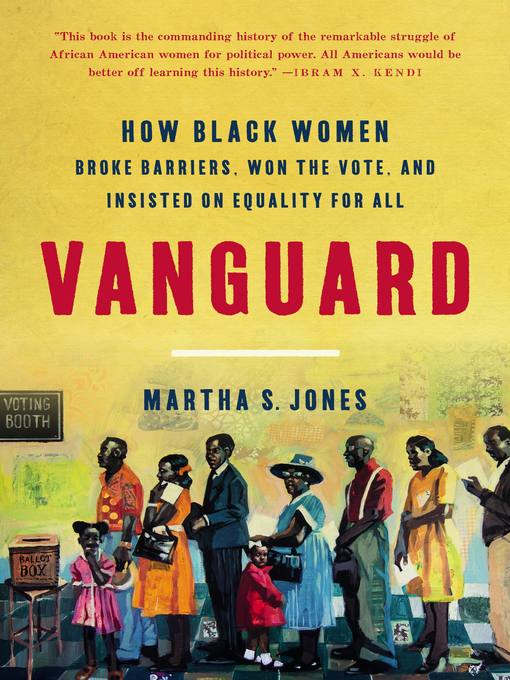
Vanguard
How Black Women Broke Barriers, Won the Vote, and Insisted on Equality for All
- اطلاعات
- نقد و بررسی
- دیدگاه کاربران
نقد و بررسی

August 1, 2020
Johns Hopkins history professor Jones turns in a searching portrait of African American women who agitated for voting rights over generations. Born into slavery in 1840 in Kentucky, Susan Davis--the author's great-great-grandmother--learned a valuable truth: "without the vote, Black Americans had to build other routes to political power." During the Reconstruction Era, in Davis' case, this involved building women's clubs to consolidate political power. She lived to see passage of the 19th Amendment, but that constitutional guarantee did not stop white Kentuckians from attempting to suppress the Black vote. Other activists adopted various tactics to press their cases, from Rosa Parks' refusal to move to the back of a bus to the sit-ins at lunch counters throughout the South. As Jones writes, the truth of Davis' conviction endured: "The women of my family, like so many Black women, constructed their political power with one eye on the polls and the other on organizing, lobbying, and institution building." Naturally, they met opposition from Whites--and often from Black men, who, notes the author, were glad to accept women as helpmeets in political situations but expected them to hold subsidiary roles. In many instances, Black women neatly sidestepped racism; in the case of her great-grandmother, Jones writes, "she would link arms with white women when they shared her sense that American women, even after the Nineteenth Amendment, had a distance to go before they realized their full influence upon politics and policy." In the end, though, many of the voting rights and civil rights activists realized that they had to build their own movement, cultivating a strong emergent leadership that included lawyers, politicians, and the first Black woman to serve as a priest in the Episcopal Church. The work continues today: Jones' sharp chronicle closes with Stacey Abrams, the Georgia politician who wages a constant campaign against voter suppression meant to keep Black voters away from the ballot box. Highly charged, absorbing reading and most timely in the era of renewed advocacy for civil rights.
COPYRIGHT(2020) Kirkus Reviews, ALL RIGHTS RESERVED.

Starred review from October 1, 2020
Beginning with her own history as a descendant of enslaved people, Jones (history, Johns Hopkins Univ.; Birthright Citizens) shares stories of women in her family who created paths to political power as freedom did not lead to liberty or dignity. This standout social history shows how the 19th Amendment did not guarantee Black women the right to vote--state laws, including literary tests, poll taxes, and restrictions on descendants of enslaved people, were implemented to suppress turnout. Jones masterfully outlines how Black women used the pen, pulpit, and podium to share information in the 19th and 20th centuries, and how teaching each other how to read and write was the greatest form of resistance. Moving chapters follow journalist Mary Ann Shadd Cary, poet and orator Frances Ellen Watkins Harper, educators Charlotte Forten Grimk� and Mary Church Terrell, and writers Harriet Jacobs and Anna Julia Cooper, among others, as they sought to link voting rights to civil rights. Notably, Jones recounts how these women, and others, such as Fannie Lou Hamer, faced danger for their visibility while often being ignored by white suffragists. VERDICT A necessary, insightful book that shines light on Black women underexplored in history. Jones writes narrative nonfiction at its best.--Stephanie Sendaula, Library Journal
Copyright 2020 Library Journal, LLC Used with permission.




دیدگاه کاربران